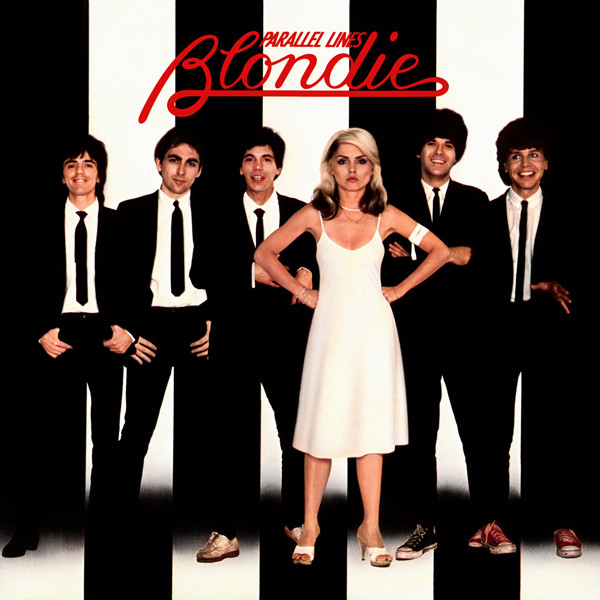Parallel Lines – Blondie – Chrysalis Records – 1978
Perhaps one of the most emblematic albums to come out of the musical melting pot of ’70s New York, Blondie’s 1978 breakthrough Parallel Lines is an explosion of influences and styles. Not quite punk, not quite pop, not quite disco — its roster of songs launched Blondie to a new level of success by combining familiar sounds from a variety of genres, mixing the past with the present and looking towards the future, all while still remaining true to their underground roots.
Each member of the band found themselves pushed out of their comfort zone by producer Mike Chapman, and with this album, they hit upon the formula that would bring forth the distinct, iconic Blondie sound for years of records to come.
In this episode, we parse through the various influences and cultural contexts that make up each song, let our nerd flags fly with sonic connections, and continue our musings and discussion of why late ‘70s New York was such fertile ground for music that has endured for decades.
Listen to Parallel Lines: iTunes | Spotify | YouTube
Subscribe on iTunes
Episode notes and postscript corrections
- If you missed our guest stint on Little Water Radio’s program The Rest is Noise, listen to the archive of it here. We come on around 39 minutes in.
- We have a thing for bands born out of CBGB. Check out our episodes on Tom Tom Club and Marquee Moon for more on this scene.
- If you’ve read our FAQs, you’ll know that we’ve repeatedly said that we’re not trying to cover iconic albums because so much has been said about them already. Parallel Lines, however, is different — we think we have more to add to the conversation.
- Here’s more about Richard Gottehrer, the producer on Blondie’s first two albums.
- And here’s some more info on Mike Chapman, who produced Parallel Lines.
- Six of the 12 tracks on the album were released as singles, and most of them had music videos to go with them. Peep our further watching links below to check them all out.
- Bop over to our Spotify playlist to hear the Nerves’ original version of “Hanging on the Telephone” back-to-back with Blondie’s cover.
- PSA: Swim team practice will be held in the PROJECTION ROOM ABOVE THE AUDITORIUM.
- Women 👏 owe 👏 Debbie 👏 Harry 👏 a 👏 whole 👏 hell 👏 of 👏 a lot. 👏
- Here’s an excerpt from the 33 ⅓ book on Parallel Lines (more about that below) that has some really interesting insights into how Blondie/Debbie forged a complicated relationship with gender and sexuality.
- Here’s a subtly savage clip from a 1980 episode of 20/20 in which Debbie schools Pierre Salinger when he judgmentally says: “There’s some sexual overtones to what you do on stage.”
- Here’s Shirley Manson’s introduction speech for Blondie’s 2006 Rock and Roll Hall of Fame induction that touches on this (and will make you feel feelings!!!).
- Let’s talk about how not much has changed since 1978 — music, and the world at large, really, is still a patriarchal system.
- Here’s an excerpt from the 33 ⅓ book on Parallel Lines (more about that below) that has some really interesting insights into how Blondie/Debbie forged a complicated relationship with gender and sexuality.
- Watch this if you want to further tease out the Mike Chapman vs. Clem Burke comparison to Jimmy Iovine vs. Stan Lynch.
- Yes, disco and punk actually evolved out of the same geographic location and similar subcultures. Read this fantastic oral history of disco from Vanity Fair for more.
- Listen to Blondie covering “I Feel Love,” then head over to our master playlist to hear the early demo “Once I Had a Love.”
- Oh, and, also, shoutout to Kraftwerk.
- There are a ton of bands that draw massive influence from Blondie — we’ve got a lot for you to listen to over on Spotify.
- Blondie disbanded in 1982, but reformed in 1997 and are still around and kicking ass now. We highly recommend their latest album Pollinator for how well it merges the classic Blondie aesthetic with 2017 — something that’s not easy for many legacy bands to do. They avoid both the pitfalls of an old band trying to sound young and relevant and an old band too stuck in their past. Thanks for being Blondie, Blondie.
Favorite track(s): 11:59 and Heart of Glass (Carly) | Sunday Girl and Hanging on the Telephone (Carrie)
Least favorite track: I Know But I Don’t Know (Carly) | 11:59 (Carrie)
Album credits:
Deborah Harry – vocals
Chris Stein – guitar, 12-string guitar, E-bow
Clem Burke – drums
Jimmy Destri – electric keyboards
Nigel Harrison – bass guitar
Frank Infante – guitar
Further Watching:
Inside the Music: Blondie’s New York | 2014
Blondie’s Rock and Roll Hall of Fame induction | 2006
Rock and Roll Punk (Blondie comes in around part 2)| 1995
Nightmoves interview | 1978
“Hanging on the Telephone” music video
“Picture This” music video
“Heart of Glass” music video
Further Reading:
Blondie’s Parallel Lines (from the 33 ⅓ book series) | 2016
Chris Stein / Negative: Me, Blondie, and the Advent of Punk | 2014
Making Tracks: The Rise of Blondie
Debbie Harry: June/July Cover Star (in-depth profile of both Debbie and Pollinator) | Nylon (May 2017)
There’s Something About Harry | Harpers Bazaar (March 2017)
Why Did ‘70s Rock Music Hate Disco So Much? | Noisey (February 2016)
Blondie: Success and Sexism | Mojo (March 2014)
35 Years Ago: Blondie Release Parallel Lines | Ultimate Classic Rock (September 2013)
Parallel Lines re-release review | Pitchfork (August 2008)
Parallel Lines review | Rolling Stone (November 1982)
Robert Christgau’s OG review | 1978
